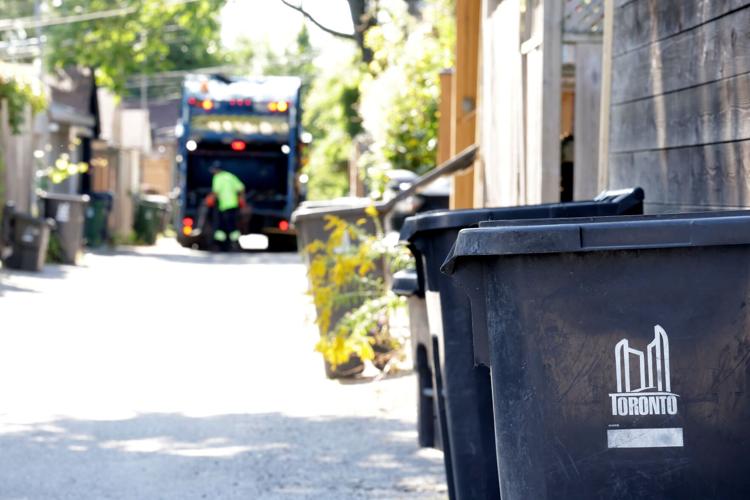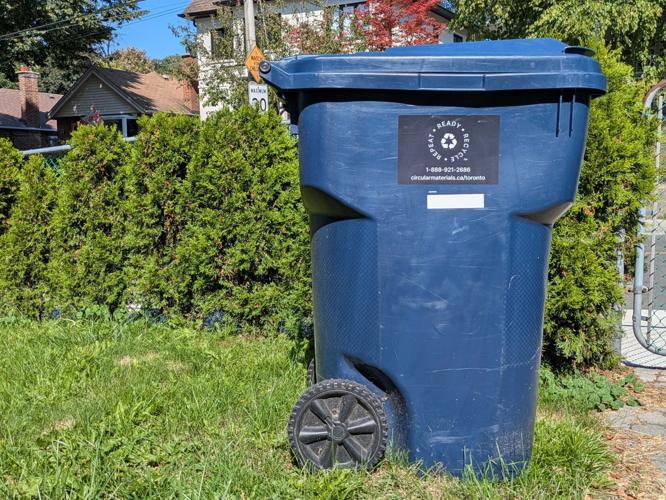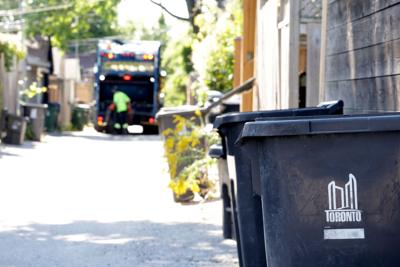It’s a small sticker slapped on the side of ∫£Ω«…Á«¯πŸÕ¯blue bins, but it signals a big ‚Äî and possibly difficult ‚Äî change to one to the city’s most basic services.Ã˝
Come Jan. 1, Toronto’s residential recycling program is being privatized and a corporation, not the municipal government,Ã˝will be responsible for collecting curbside blue boxes.Ã˝
Over the past few months,Ã˝stickers bearing contact information for the new company have been added to the bins, covering up the old city logo and alerting residents of the change, which has been legislated by the Ontario government. But some officials at city hall are bracing for a rocky transition, which they worry could confound residents and lead to more recyclable material ending up in the trash.
The change comes as Toronto’s main landfill is approaching capacity, reinforcing the importance of having effective diversion programs like the blue bins that keep trash out of dumps.Ã˝
“It’s really going to be confusing” if residents don’t understand “that it’s a brand new system,” Coun. Paula Fletcher (Ward 14, Toronto-Danforth), who chairs Toronto’s infrastructure and environment committee, said of the privatization.Ã˝
She said most constituents she’s spoken to haven’t noticed the stickers, and the public has yet to get the message that “it will no longer be city trucks picking up any of the recycling, and we won’t be making policy (about recycling collection) at city hall.”
Adding to Fletcher’s anxiety is what she calls the program’s “ridiculous start date” of New Year’s Day, when recycling bins will be fuller than normal and residents will be distracted by the holidays. “So everything’s pointing now, on Jan. 1, to being a difficult start,” the councillor said.Ã˝
Privatizing blue bin recycling
The Ontario government passed legislation in 2016 to create the so-called extended producer responsibility (EPR) system, under which companies that manufacture recyclable packaging will also be responsible for collecting it. The province says the regime will give producers incentive to make their products easier to recycle, and save municipal governments money.
Although EPR is also supposed to make economiesÃ˝more sustainable, environmentalists have criticized Premier Doug Ford’s government for watering down the program afterÃ˝producers complained of rising costs. Regulations released in early September gave producers a two-year grace period before they have to meet hard recycling targets,Ã˝and set what critics say is a low bar for how much difficult-to-recycle flexible plastics they have to recover.Ã˝
A company called Circular Materials ‚Äî a non-profit representing corporate giants such as Nestle, McDonald’s and Costco ‚Äî is taking over Toronto’s blue boxes. It will be responsible for recycling collection, transfer, haulage, promotion and education, as well as fielding residents’ requests for bin repairs and replacements.
Technically, the changeover has already begun; curbside recycling shifted to Circular Materials in July 2023, but the city has continued to perform the service under contract to the company to ease the transition. As of Jan. 1, GFL Environmental will take over, under contract to Circular Materials.Ã˝
New program raises concerns
While the city and Circular MaterialsÃ˝are launching campaigns to educate Torontonians, some councillors worry residents caught off guard by the switch will still complain to the city about any problems with the new service.
They also fear Circular Materials will have less tolerance for recycling bin contamination, which is when material that is soiled or otherwise can’t be recycled is left in the blue box, making it difficult and costly to sort out recoverable items. If the company refuses to accept contaminated bins, residents might dump them in the garbage instead.
There are also concerns around recycling promotion and education. The city delivers a range of programs encouraging residents to recycle, and has made guides about diversion programs .
UnderÃ˝, Circular Materials will only have to provide information in English andÃ˝French, andÃ˝some advocates caution that pared-down education campaigns could contribute to lower recycling rates.
Allen Langdon, CEO of Circular Materials, said in an email that the company is “committed to delivering an efficient and effective recycling system,” and its goal is “a seamless transition.” The non-profit has been working with ∫£Ω«…Á«¯πŸÕ¯to educate the public on the change, and is planning a “robust communication campaign” this fall, he said.Ã˝

Ã˝The city has already sent out stickers to residents for them to cover up the old city of ∫£Ω«…Á«¯πŸÕ¯logo on their blue bins.Ã˝
Barry BrimbecomLangdon rejected claims that EPR will lead to lower recycling rates, and said the system has been shown to boost recycling in other jurisdictions. Residents will be able to recycle more materials than under the city-run system, he noted. Last year, the company launched to recycle takeout coffee cups and other paper-based beverage containers, whichÃ˝weren’t previously accepted.
He didn’t confirm that Circular Materials would have a higher standard about nonrecyclable materials in bins, but acknowledged that reducing contamination will be a “key priority” for the company, which it will tackle through education, and upgrades to sorting equipment.
Langdon didn’t guarantee that residents’ collection schedules will stay the same, but pledged to inform the public well in advance of any changes.Ã˝
Late changes cause confusion
Michael Skaljin, the city’sÃ˝project director for EPR, said ∫£Ω«…Á«¯πŸÕ¯has “been working very closely with Circular Materials to ensure that that transition does go very smoothly.”Ã˝
It’s also creating a customer care team of four full-time staff to help residents through the transition, at a cost of about $500,000 annually, .
Toronto’s landfill is nearing capacity and the First Nation living next to it wants it shut down. Finding a solution won’t be easy.
Toronto’s landfill is nearing capacity and the First Nation living next to it wants it shut down. Finding a solution won’t be easy.
Late changes to the new system have already caused confusion, however. Proposed regulations the province posted in June would have cancelled the rollout of EPR to multi-residential buildings that weren’t already served by the city’s blue box program (some buildings opt for private collectors).
Skaljin told the Star last month that as a result of the amendment the city could end up responsible for collection at some buildings that the producers aren’t obligated to start servicing next year, such as new builds. “We haven’t really prepared for that” he said at the time.Ã˝
The regulations the province filed this month merely delayed the rollout of EPR to more buildings until 2031, instead of cancelling it outright. A ∫£Ω«…Á«¯πŸÕ¯spokesperson said staff are reviewing what the updated rules will mean for the city.

































To join the conversation set a first and last name in your user profile.
Sign in or register for free to join the Conversation